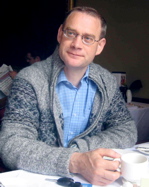Andrew Clarke: Serve the Community of the Church
 Andrew D. Clarke, Serve the Community of the Church: Christians as Leaders and Ministers (Grand Rapids: Eerdmans, 2000), 305 pages.
Andrew D. Clarke, Serve the Community of the Church: Christians as Leaders and Ministers (Grand Rapids: Eerdmans, 2000), 305 pages.
Clarke’s interest lies in discerning the attitude towards leadership in the early church, in New Testament times. Rejecting the traditional, protestant position that the early church was essentially a charismatic community which, through time, sublimated the offices identified in the later Pauline epistles, Clark leads us into a fascinating study of the real tensions over various styles of leadership that he traces in the New Testament, models present from the very beginnings of the church. His thesis is that leadership did exist in the earliest Christian communities, but that a distinction needs to be made between ‘the social processes that were active in a given Pauline community and the nature of godly leadership to which Paul appealed in his corrective statements’ (p 172).

Andrew D. Clarke
Clarke begins by seeking to identify the models of leadership present in the 1st century Graeco-Roman context. He reviews, in the 1st part of his book, leadership models in the Graeco-Roman city, the Roman colony and city, in voluntary associations, the family and household and the Jewish synagogue. In the 2nd part of the book, Clark goes on to trace the struggles over issues of leadership within the early Christian communities. On the one hand, there are the norms of community leadership carried into church from the wider community which influence the attitude and behavior of Christians in their embryonic gatherings. On the other hand there is the influence of Jesus, and the challenge to work through the implications of our life in Christ, in influencing how leadership is to be construed and applied.
Clarke’s excellent scholarship is not unapplied. Subtly yet respectfully, he leads us to see where his meticulous study would take us. In what is the best study in Biblical models of leadership that I have read, he makes a bold yet soundly based affirmation: that Christian leadership, properly understood, is fundamentally different from the models that operate in worldly structures. Clark carefully and thoroughly works through the implications of what any Greek scholar can confirm: that Paul deliberately avoids describing himself as a ‘leader’ and disregards extra-New Testament words for ‘leader’ as descriptors for any key function in the church. What a disturbing yet liberating discovery of a basic, biblical truth this could be for those entrusted with leadership roles in today’s church.
This book is a must for all who would take seriously the Bible as leading us into alternative way of leading the church.
Reviewed by James Purves
Category: Ministry, Spring 2005


